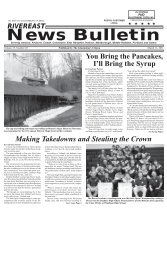August 13, 2010 - Glastonbury Citizen/Rivereast News Bulletin
August 13, 2010 - Glastonbury Citizen/Rivereast News Bulletin
August 13, 2010 - Glastonbury Citizen/Rivereast News Bulletin
You also want an ePaper? Increase the reach of your titles
YUMPU automatically turns print PDFs into web optimized ePapers that Google loves.
Alleged Victim cont. from Front Page<br />
plainants had refused to speak with him,<br />
Sommaruga said. The first time he ever heard<br />
from Shepard, he said, was earlier Tuesday<br />
evening when she spoke publicly.<br />
“The town did take this seriously,”<br />
Sommaruga said. “There was an investigation<br />
done.”<br />
When O’Keefe announced the downsizing of<br />
the police department on June 22, one of the<br />
positions cut was a civilian administrative position.<br />
O’Keefe said at the time that he did not<br />
know which employee would be laid off, but<br />
for now, all police support staff remain at work.<br />
The entire meeting, which was moved from<br />
Town Hall to the high school auditorium because<br />
so many people attended, was marked<br />
with hostility from beginning to end. Audience<br />
members repeatedly interrupted the council as<br />
they discussed changing the town’s ordinances<br />
and charter to remove references to the police<br />
chief, booing and calling upon O’Keefe to resign.<br />
The proposed changes to Chapter 109 of the<br />
town’s ordinances would abolish the position<br />
of police chief, and give the town manager administrative<br />
control over the department. The<br />
lieutenant, though, would oversee daily operations<br />
of the police department, as well as the<br />
responsibilities and duties that the chief of police<br />
previously held and that the town manager<br />
cannot perform.<br />
The Town Council voted 5-1 to send the proposed<br />
ordinance changes to public hearing, with<br />
only Sue Weintraub voting against it. (Council<br />
member Bill Devine was not present.) A public<br />
hearing is the first step in changing an ordinance<br />
– after listening to public comment, the<br />
council will vote on it. The hearing will be held<br />
Tuesday, Aug. 31, at 6:30 p.m., at East Hampton<br />
High School, 15 North Maple St.<br />
“I have big problems with this ordinance,”<br />
Weintraub said. “I don’t think it should be enacted.”<br />
“To restructure the police department during<br />
this time is foolish,” she continued. “It’s shattering<br />
the public trust.”<br />
Weintraub asked O’Keefe how many ordinances<br />
would be impacted if the town council<br />
voted to remove all references to the police<br />
chief. There were six, O’Keefe responded.<br />
“Do you think there might be more than that,<br />
like closer to 18?” Weintraub retorted.<br />
“This is a tough one, no question,” council<br />
“Tonight, a woman had the courage to stand<br />
before you and the person she made those allegations<br />
against,” said Kyle Dostaler. “What did<br />
you do? Nothing.”<br />
“I think it’s about time you really listen to<br />
what the public has to say,” said Angela<br />
Sarahina. Sarahina also said O’Keefe should<br />
be on administrative leave until all investigations<br />
into his conduct were complete. By leaving<br />
O’Keefe at work, she said, he was intimidating<br />
the town employees.<br />
Tuesday’s meeting was the first time residents<br />
had a chance to publicly discuss<br />
Reimondo’s layoff since the last Town Council<br />
meeting on July <strong>13</strong>. Two days after that meeting,<br />
the town accepted a motion from<br />
Reimondo’s attorney, Leon Rosenblatt, arguing<br />
in favor of giving him a public hearing about<br />
his layoff. Reimondo had the start of a hearing<br />
on July 2, but it ended quickly when<br />
Sommaruga argued Reimondo had no legal<br />
right to a hearing.<br />
Addressing questions Tuesday about whether<br />
Reimondo would be granted a hearing, O’Keefe<br />
said Attorney Nick Grello was still reviewing<br />
Rosenblatt’s motion. O’Keefe said Rosenblatt<br />
would be on vacation soon, which would further<br />
delay the hearing if he and Grello decided<br />
to grant it.<br />
* * *<br />
In other business at the meeting, the Town<br />
Council reviewed the employee handbook, recently<br />
drafted by Human Resources Director<br />
Lisa Seymour with the advice of Sommaruga.<br />
Weintraub said the language in parts of the<br />
handbook was intimidating, including a section<br />
about investigations that said that failing to<br />
cooperate with a supervisor or manager in an<br />
investigation “may lead to discipline which may<br />
include discharge.”<br />
Sommaruga said that when an employee<br />
agreed to the handbook, they were not signing<br />
away their rights. But he said he had no problem<br />
with sending the draft handbook back to<br />
Seymour to make changes, including adding an<br />
index to make the book more user-friendly.<br />
Sommaruga thanked Seymour for her help<br />
with the handbook, explaining that “she should<br />
be heralded for spending the last few years gathering<br />
this information.”<br />
The council voted to accept the changes to<br />
the Boating and Navigation Task Force. The<br />
largest changes to the ordinance are the intromember<br />
Thom Cordeiro said as he looked at<br />
the revised police chief ordinance. He stressed<br />
that when looking for ways to save money, it<br />
was important to look at the position of police<br />
chief as being separate from the individual occupying<br />
that position.<br />
Weintraub questioned O’Keefe as to how<br />
much money restructuring the police department<br />
would save. Weintraub said she had<br />
learned Acting Lt. Michael Green had received<br />
an $8,000 raise when he was promoted to lieutenant,<br />
which O’Keefe confirmed. She said<br />
O’Keefe previously told her Green would not<br />
be receiving a raise, which he also confirmed.<br />
In addition, Weintraub said, the town was accumulating<br />
legal fees from the investigations<br />
into the harassment allegations and Reimondo’s<br />
layoff.<br />
Weintraub also pointed out that she would<br />
be apprehensive to make the town manager the<br />
police chief, since, as an appointed official, the<br />
town manager is not directly accountable to the<br />
public. Sommaruga called the concerns about<br />
making O’Keefe police chief “fictitious.” According<br />
to the state attorney general’s office,<br />
he said, whether a town manager could be police<br />
chief was “a matter of local concern.”<br />
“There was no intention to make the town<br />
manager the police chief,” Sommaruga said.<br />
On June 22, immediately after O’Keefe laid<br />
Reimondo off, the council voted to make<br />
O’Keefe the interim police chief until the position<br />
could be removed from the town’s ordinances.<br />
That decision, Weintraub pointed out,<br />
was still in effect.<br />
“This council does not deserve the continued<br />
respect of this audience,” shouted resident<br />
Mary Ann Dostaler as the council discussed<br />
sending the changes to a public hearing. Engel<br />
urged her to be quiet. Dostaler relented, but remained<br />
standing. Around her in the crowd, other<br />
residents started standing up and chanting “No!<br />
No!” as the council voted to send the proposed<br />
ordinance changes to a public hearing.<br />
In the public remarks at the end of the meeting,<br />
many residents criticized the Town Council<br />
for seemingly ignoring the public’s wishes.<br />
“When you sleep at night, do you ever think<br />
about the public you’re supposed to serve?”<br />
asked Bonnie Sweete-Reilly.<br />
Others hoped that Shepard’s decision to<br />
speak out would make the Council rethink their<br />
position.<br />
duction of speed limits – slow enough not to<br />
create a wake during nighttime hours, and 40<br />
miles per hour from 7 a.m. until half-an-hour<br />
after sunset.<br />
Before the regular meeting, the Town Council<br />
heard public comment about the navigation<br />
ordinance. One resident, Roy Duncan, said that<br />
while the town was instituting speed limits for<br />
the lake, the real issue in the area was noise,<br />
from boats with loud engines and stereo systems.<br />
“The Town Council has been dancing around<br />
the issue for years,” Duncan said. But another<br />
resident, Fred Galvin, said the Department of<br />
Environmental Protection had recently inspected<br />
all the boats on the lake, saying engine<br />
noise was not a problem.<br />
Other residents, including Mary Ann<br />
Dostaler, questioned how the ordinance would<br />
be enforced, since the police department’s boat<br />
was currently out of service.<br />
During the regular meeting, the Town Council<br />
voted to establish an arts and cultural commission,<br />
consisting of council member Cordeiro<br />
and nine other people involved in East<br />
Hampton’s arts community. The commission,<br />
Cordeiro explained, would provide direction<br />
and help coordinate events between the town’s<br />
many arts organizations.<br />
Cordeiro also provided an update about the<br />
ongoing noise monitoring that he and Town<br />
Council Vice Chairman John Tuttle had been<br />
conducting. Cordeiro said he and Tuttle had<br />
been checking the neighborhood around<br />
Angelico’s Lake House throughout the summer<br />
to take decibel measurements. So far, Cordeiro<br />
said, the noise had not been excessive, though<br />
he urged residents in the neighborhood to offer<br />
him and Tuttle more feedback.<br />
The council also voted to have O’Keefe and<br />
Director of Finance Jeff Jylkka look into switching<br />
the employee pensions from a defined benefit,<br />
in which government employees receive<br />
pension benefits for life, to a defined contribution,<br />
which would end the town’s liability when<br />
an employee leaves their job. The change, Engel<br />
explained, would only affect new employees, but<br />
was expected to save the town money over time.<br />
* * *<br />
The next regularly scheduled Town Council<br />
meeting will be Tuesday, Sept. 14, at 6:30 p.m.,<br />
at Town Hall, 20 East High St.<br />
East Hampton ZBA Approves Outdoor Entertainment at Angelico’s<br />
by Claire Michalewicz<br />
The Zoning Board of Appeals (ZBA) Monday<br />
upheld an opinion that outdoor entertainment<br />
is a permitted accessory use at restaurants,<br />
allowing live bands to continue playing on the<br />
patio at Angelico’s Lakehouse.<br />
In May, Town Manager Jeff O’Keefe asked<br />
Building, Planning and Zoning Administrator<br />
Jim Carey whether outdoor entertainment was<br />
a permitted accessory use for a restaurant.<br />
O’Keefe’s question came in response to a complaint<br />
from Bellevue Street resident Fran Klein,<br />
who said the live music at Angelico’s was disrupting<br />
her quality of life.<br />
Carey said he felt it was a permitted use,<br />
pointing out that East Hampton has a long history<br />
of outdoor entertainment, and that there<br />
were other restaurants in town that also played<br />
music outside. The ZBA would have needed<br />
four votes to overrule Carey’s decision, but instead<br />
it voted 4-1 (with member Don Martin<br />
opposed) to agree with him.<br />
Klein’s attorney, Eric Rothauser, argued that,<br />
according to newspaper articles from the late<br />
1990s, owner Paul Angelico had no intention<br />
of continuing outdoor entertainment at his restaurant,<br />
the former Hathaway Inne. For him to<br />
resume outdoor entertainment, Rothauser argued,<br />
Angelico would have required a special<br />
permit. In addition, Rothauser said, the restaurant<br />
occupied two lots, and the one with the<br />
outdoor patio was zoned residentially.<br />
“This isn’t a popularity contest,” Rothauser<br />
said, addressing comments from residents at a<br />
previous meeting, when several residents said<br />
the restaurant was an important part of the community.<br />
Instead, he said, he was just asking that<br />
the town enforce zoning regulations fairly.<br />
But Angelico’s attorney, Mike Dowley, said<br />
the restaurant never needed a special permit,<br />
since, as Carey had said, outdoor entertainment<br />
was not a nonconforming use. The repeated<br />
complaints about noise were an attempt by<br />
neighbors to shut down Angelico’s, Dowley<br />
said.<br />
“They’re gonna take every avenue they can<br />
to stop the restaurant,” Dowley said. Recently,<br />
he pointed out, nearby resident Angelo<br />
Tammaro had contested Carey’s decision to allow<br />
a large fence along the edge of the<br />
Angelico’s patio. The fence was built atop a<br />
mound of earth, which Tammaro alleged was<br />
done to get around zoning regulations about<br />
fence height. (Last month, the Planning and<br />
Zoning Commission voted to send Tammaro’s<br />
complaint to the ZBA, which has not yet discussed<br />
the issue.)<br />
If the neighbors were actually concerned<br />
about noise, Dowley said, they would have<br />
welcomed the fence, which was built to deflect<br />
noise away from the houses to the north of the<br />
restaurant.<br />
“My client, despite what the neighbors are<br />
saying, is doing what he can,” Dowley said. In<br />
addition to erecting the fence, Dowley said,<br />
Angelico frequently asked bands to turn down<br />
the volume of their speakers when he felt they<br />
were too loud. Dowley said the ongoing complaints<br />
about the restaurant were upsetting to<br />
him and Angelico, since Angelico had been<br />
cooperating with the town to find ways to reduce<br />
the noise.<br />
“I’m proud of my client,” Dowley said. “Mr.<br />
Angelico’s intent is clearly not to aggravate the<br />
neighbors.”<br />
ZBA member Thomas Keegan said that if<br />
they voted to overturn Carey’s decision, they<br />
would have to shut down outdoor entertainment<br />
throughout the town.<br />
ZBA Vice Chairman Brendan Flannery<br />
agreed, saying Carey had historically applied<br />
the same regulations to all zoning applications<br />
and appeals. To prohibit outdoor entertainment<br />
at Angelico’s, Flannery said, would be unfair<br />
unless they did the same at the town’s other restaurants.<br />
“We’d have to change a lot in our regulations,”<br />
Flannery said.<br />
However, Martin said that while East Hampton<br />
had a history of outdoor entertainment<br />
around the lake, that culture had started when<br />
most houses in the area were summer cottages.<br />
Now that more year-round residents lived near<br />
the lake, he said, the character of the community<br />
had changed.<br />
East Hampton, Martin said, “is no longer a<br />
lake town.”<br />
Speaking after the meeting, Klein said she<br />
wasn’t surprised by the decision, and said she<br />
would think about what she would do next concerning<br />
the noise. Rothauser added that while<br />
he was disappointed the appeal was dismissed,<br />
he was happy to see Martin agree that the town<br />
needed to look at noise control options.<br />
Angelico’s owner Paul Angelico declined to<br />
comment, but Dowley said he was pleased with<br />
the results.<br />
“They did what they had to do,” Dowley said.<br />
Since Klein had appealed an unofficial decision,<br />
Dowley said, her appeal had no merit, and<br />
the ZBA had done right by denying it.
















